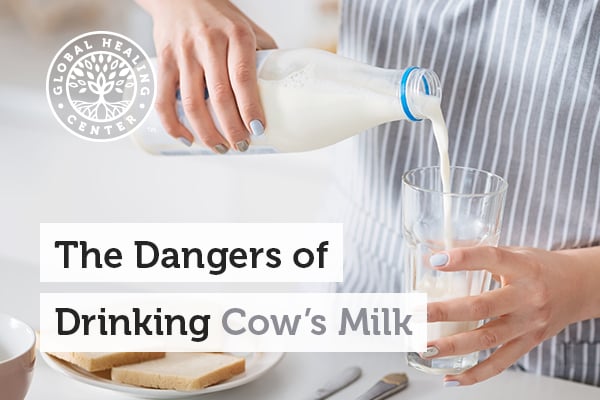
Due to the extreme processes that milk goes through and the high amounts of antibiotics, hormones, and genetically-modified substances that cows are continually exposed to, I believe there are real and eminent concerns associated with drinking milk from cows. All cows release toxins through their milk, as milk is a natural exit-portal for substances that the body cannot use.
"Ingredients" Added to Cow's Milk
- A Veritable Hormone Cocktail: including pituitary, steroid, hypothalamic, and thyroid hormones (remember most cows are extremely stressed)
- Gastrointestinal Peptides: Nerve and epidermal growth factors, and the growth inhibitors MDGI and MAF
- rBGH (Recombinant Bovine Growth Hormone): a genetically engineered hormone directly linked to breast, colon and prostate cancer. This is injected into cows to increase milk production. [1]
- Pus: National averages show at least 322 million cell-counts of pus per glass! [2] This is well-above the human limit for pus-intake, and has been directly linked to paratuberculosis bacteria, as well as Crohn's disease. The pus comes from infected udders on the cows known as mastitis.
- Blood Cells: The USDA allows up to 1.5 million white blood cells per milliliter of commonly-sold milk. [3] Yes, you are drinking cow's blood in the milk and the USDA allows this!
- Antibiotics: Currently, cows are in such a state of disease and mistreatment that they are continually being injected with antibiotic medicines, and rubbed down with chemical-laden ointments to deal with their chronic infections. Currently, regulating committees only test for 4 of the 85 drugs in dairy cows. This means that the other 81 drugs in cow's milk are coming directly into your glasses and bodies. Estimates show that 38% of milk in the U.S. is "contaminated with sulfa drugs or other antibiotics," according to a study by the Centre for Science in the Public Interest and published in the Wall Street Journal on December 29, 1989. A study from the FDA data showed that over half of all milk was laden with traces of pharmaceuticals yet nothing has been done to control this.
How Does This Affect the Cows?
Not only are people drinking these toxins, they are also taking in the energetic effects of the life of the cow.
Studies show that many cows are infected with incredibly painful infections such as mastitis. [4] Due to over-milking, artificial hormones, bacteria and medications, cow's udders can become chronically inflamed, thus altering the color and taste of the milk. Over time, this bacterial invasion causes harm to the cow's mammary gland, reeking havoc on the milk being produced. From parasitic worms to cancerous tumors, these diseases are often passed along to the next generation of cows, and more often, into the milk we drink.
Often times the conditions in which cows live, as well as the rigorous milking regimes, cause dairy cattle to live in a permanent state of sympathetic (stress) response, as well as adrenal overload. When our adrenal glands are overworked for long periods of time, there is a overload of cortisol in the blood. When we drink this milk, we are then exposed to the millions of stress-response cells in the milk of cows. It is no wonder that we are a chronically stressed society!
Avoid Dangers Related to Cow's Milk
Here are some ways to avoid the dangers associated with cow's milk:
- Replace cow's milk with healthy natural substitutes: rice milk, almond milk, raw goat's milk or my favorite - hemp milk.
- If you do insist on drinking cow's milk, make sure to buy only the non-genetically modified, range fed, organic raw versions. Even better, talk to your local organic farmer to make sure the cows are treated kindly.
- Eat less cheese and always buy organic versions. Goat's cheese is the best for you!
References (4)
- “Recombinant bovine growth hormone.” American Cancer Society. 9 Oct. 2014. Web. 12 Dec. 2016.
- PETA. Cows Used for Their Milk. The Dairy Industry.
- Adkinson RW, Gough RH, Graham R, Yilmaz A. Implications of proposed changes in bulk tank somatic cell count regulations. J Dairy Sci. 2001 Feb;84(2):370-4
- The Merck Veterinary Manual. Mastitis in Cattle. Merck Sharp & Dohme Corp.
†Results may vary. Information and statements made are for education purposes and are not intended to replace the advice of your doctor. If you have a severe medical condition or health concern, see your physician.







